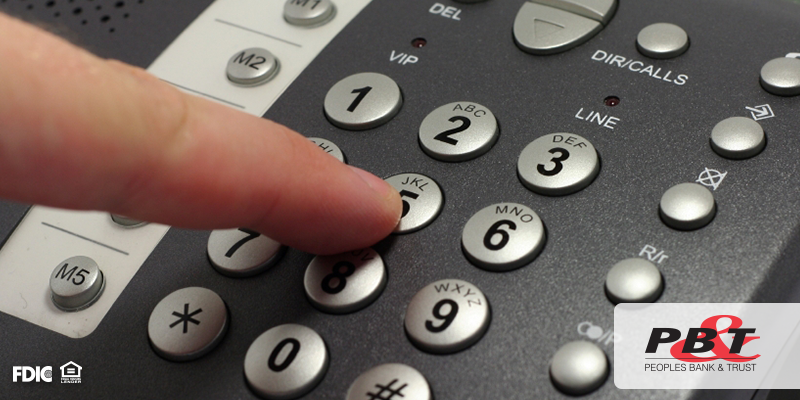
Often times, phishing calls can come off as friendly or even helpful, however, in many instances the caller is malicious and intends to compromise your personal information. Peoples Bank & Trust wants to help you avoid situations like these, and offers the following key prompts to help you identify a fraudulent caller. Keep these five points at the top of your mind the next time you’re wary of an unknown caller:
The matter is deemed extremely urgent by the caller. The biggest and clearest red flag is when the individual calling claims that you HAVE to update or adjust something ASAP. The caller will then indicate that they are from an institution you may know, and they need to know your personal information ASAP. DO NOT give out this information. If you think a company you work with may truly need to update an account, call them at the number you have listed and inquire about the presentation the prior caller shared. Nine times out of ten the company will not be aware of any need to update the information and will take note of the fraudulent call being conducted to its customers.
The offer or promotion seems too good to be true. When someone calls claiming that you have won a foreign lottery, been chosen for an all-inclusive cruise, or received some other once-in-a-lifetime opportunity, chances are it’s a scam. On numerous occasions, fraudsters have used this ruse to illicit payment or personal information to “process your winnings.” Unless you specifically remember entering into a sweepstakes for the prize you are being called about, this call is a scam.
The person calling is asking for personal information. Not every time will the caller claim you have won a prize. Sometimes it may be as simple as a person posing as a business contact you work with, asking to verify some information. Whether it’s an insurance company, financial institution, or other entity, always ask if you can call the person back, and call them at the number you have in your records. If this number is different from the one which just called, you may have just avoided a scam.
Reverse lookup the phone number. Sometimes there is just something about a call that gives you a gut feeling that it’s not right. In cases like these, we recommend looking up the number on whitepages.com with their reverse lookup feature. This will not only tell you where the call is coming from, but can also alert you if the number has been flagged as a scam.
With these four tactics, Peoples Bank & Trust hopes you and your personal information can stay safe and secure. If you’re looking for more cyber security tips and tricks, be sure to check our blog. We share a new identity theft related topic each and every month.
Peoples Bank & Trust Co.
Member FDIC
Equal Housing Lender



